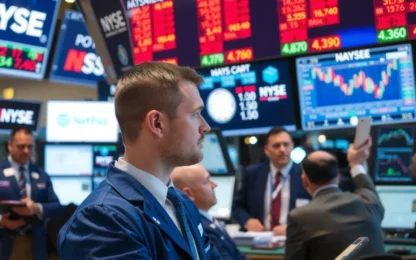
How Wall Street banks cashed in on Trump’s tariff turbulence as market volatility boosted equity trading revenues
- Leading US banks posted better-than-expected earnings amid a surge in equity trading due to tariff volatility.
- Investment banking divisions saw muted activity as corporates reconsidered deal-making plans.
- Historically, banks with strong capital markets ops have seen trading revenues rise during such volatility.
While US President Donald Trump’s renewed tariff campaign has rattled markets and tested corporate nerves, Wall Street banks are reaping the rewards.
Major US lenders have reported robust earnings for the first quarter, buoyed by a resurgence in equities trading as investors scrambled to reposition portfolios amid mounting geopolitical tensions and trade uncertainty.
Bank of America, Goldman Sachs, JPMorgan Chase, Morgan Stanley, and Citi have all exceeded analysts’ expectations, citing increased client activity and market swings as key drivers behind the revenue surge.
Bank of America, Citi, and Goldman Sachs all beat forecasts
Copy link to sectionBank of America reported on Tuesday that its equities trading revenue rose 17% to $2.2 billion, marginally ahead of estimates.
Fixed income trading brought in $3.5 billion, also exceeding expectations.
Overall, the bank’s quarterly profit rose 11% to $7.4 billion, or 90 cents a share, while revenue climbed nearly 6% to $27.51 billion.
Citigroup also posted a sharp increase in equity trading revenue—up 23% to $1.5 billion—thanks to “increased market volatility” and heightened client activity.
This helped the bank beat revenue forecasts despite broader economic uncertainty.
Goldman Sachs, which reported its earnings a day earlier, saw equities trading revenue jump 27% to $4.19 billion—roughly $540 million above estimates.
Overall revenue rose 10% to $10.71 billion, supported by gains in both trading and investment banking.
The bank said that rising trading revenue in the quarter offset a slight decline in asset and wealth management revenue compared with a year earlier.
JPMorgan Chase delivered an 8% rise in revenue to $46.01 billion. Trading revenue alone surged 48% to $3.8 billion, again beating Wall Street expectations.
Morgan Stanley, too, posted a strong quarter, with equity trading revenue up 45% to $4.13 billion.
The bank’s total earnings rose 26% to $4.32 billion, or $2.60 per share.
Volatility led to muted activity in investment banking
Copy link to sectionDespite the strong financial performance, bank chiefs sounded a note of caution on the outlook.
“The economy is facing considerable turbulence, with the potential positives of tax reform and deregulation and the potential negatives of tariffs and trade wars,” JPMorgan Chase CEO Jamie Dimon said.
“As always, we hope for the best but prepare the firm for a wide range of scenarios.”
Goldman Sachs CEO David Solomon similarly warned that the business environment had changed dramatically since the beginning of the year.
“Our clients, including corporate CEOs and institutional investors, are concerned by the significant near-term and longer-term uncertainty that has constrained their ability to make important decisions,” Solomon said.
Solomon echoed the concerns raised by his peers at JPMorgan and Morgan Stanley, noting that heightened market volatility had prompted corporate clients to delay or reconsider their deal-making plans.
“In investment banking, the volatile backdrop led to more muted activity relative to the levels we had expected coming into the year,” he told analysts on Monday.
A familiar pattern in times of turmoil
Copy link to sectionThe current trading windfall is not without precedent.
In past episodes of geopolitical and economic stress, banks with strong capital markets operations have often seen a boost in trading revenue.
During the 2018 US-China trade war, Goldman Sachs recorded a 17% year-over-year rise in equity trading revenue, while JPMorgan and Morgan Stanley also benefited from a surge in market activity.
Similar patterns were seen during the Brexit referendum in 2016 and the early months of the COVID-19 pandemic in 2020, when trading desks capitalised on extreme market swings.
In Q2 2020, JPMorgan’s markets and securities services revenue soared 77%, while Citigroup’s equity trading revenue rose 41% year-over-year.
That period was marked by record trading volumes as investors rapidly adjusted to the economic shock triggered by the pandemic.







